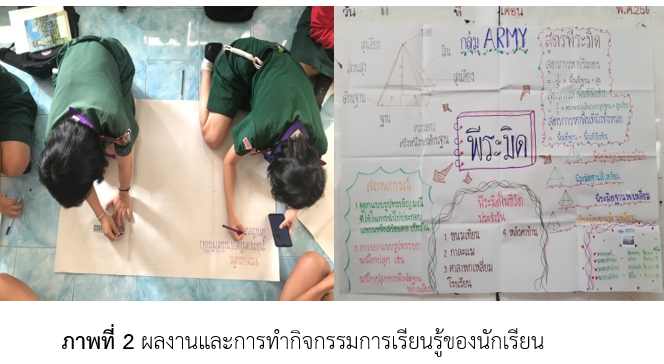การพัฒนาการจัดการเรียนรู้โดยบริบทเป็นฐาน เรื่อง พื้นที่ผิวและปริมาตร ที่ส่งเสริมการนำเสนอตัวแทนความคิดทางคณิตศาสตร์ สำหรับนักเรียนชั้นมัธยมศึกษาปีที่ 3
Main Article Content
บทคัดย่อ
การวิจัยครั้งนี้มีวัตถุประสงค์เพื่อ 1) ศึกษาแนวทางการจัดการเรียนรู้โดยใช้บริบทเป็นฐานที่ส่งเสริมการนำเสนอตัวแทนความคิดทางคณิตศาสตร์ 2) ศึกษาผลการจัดการเรียนรู้โดยใช้บริบทเป็นฐานที่มีต่อการนำเสนอตัวแทนความคิดทางคณิตศาสตร์ เรื่อง พื้นที่ผิวและปริมาตร สำหรับนักเรียนชั้นมัธยมศึกษาปีที่ 3 กลุ่มเป้าหมายคือนักเรียน จำนวน 23 คน ในโรงเรียนขนาดกลางประจำอำเภอในจังหวัดตาก ผู้วิจัยใช้รูปแบบการวิจัยปฏิบัติการในชั้นเรียน จำนวน 5 วงจรปฏิบัติการ โดยใช้ระยะเวลาทั้งหมด 17 ชั่วโมง เครื่องมือที่ใช้ในงานวิจัย ได้แก่ แผนการจัดกิจกรรมการเรียนรู้ แบบสะท้อนผลการจัดการเรียนรู้ ใบกิจกรรมและแบบวัดความสามารถในการนำเสนอตัวแทนความคิดทางคณิตศาสตร์ วิเคราะห์ข้อมูลเชิงเนื้อหาและตรวจสอบความน่าเชื่อถือแบบสามเส้าโดยใช้แหล่งข้อมูลมากกว่าหนึ่งแหล่ง และใช้เกณฑ์การวิเคราะห์แบบแยกประเด็น ผลการศึกษาพบว่า แนวทางการจัดการเรียนรู้โดยใช้บริบทเป็นฐานที่ส่งเสริมการนำเสนอตัวแทนความคิดนั้น มีประเด็นที่ควรเน้น คือ ครูควรนำเสนอสถานการณ์เกี่ยวกับรูปทรงในบริบทที่นักเรียนชนเผ่ากะเหรี่ยงพบเจอในชีวิตจริง ตรวจสอบความรู้ของนักเรียนก่อนนำเสนอสถานการณ์ในบริบทที่นักเรียนไม่คุ้นเคย และครูควรส่งเสริมให้นักเรียนจำลองรูปทรงให้อยู่ในรูปตัวแบบเรขาคณิต ลงมือปฏิบัติเพื่อให้เกิดความคิดรวบยอด ใช้การนำเสนอตัวแทนความคิดทางคณิตศาสตร์ในการแก้ปัญหา แลกเปลี่ยนความคิดเห็นกับเพื่อนเมื่อนำเสนอหน้าชั้นเรียน อาจให้นำเสนอเพิ่มเติมเป็นภาษากะเหรี่ยงเพื่อเพิ่มความเข้าใจกับเพื่อนในชั้นเรียน และให้ยกตัวอย่างสถานการณ์ที่จะนำความรู้ไปใช้ในชีวิตจริง นักเรียนส่วนใหญ่มีความสามารถในการนำเสนอตัวแทนความคิดทางคณิตศาสตร์อยู่ในระดับดี กล่าวคือ นักเรียนสามารถกำหนดตัวแปรที่นำไปสู่การแก้ปัญหาสถานการณ์ และวาดตัวแบบเรขาคณิตที่ได้จากสถานการณ์และนักเรียนสามารถเลือกใช้สูตรได้เหมาะสม และดำเนินการแก้ปัญหาได้
Article Details

อนุญาตภายใต้เงื่อนไข Creative Commons Attribution-NonCommercial-NoDerivatives 4.0 International License.
วารสารวิทยาศาสตร์และวิทยาศาสตร์ศึกษา (JSSE) เป็นผู้ถือลิสิทธิ์บทความทุกบทความที่เผยแพร่ใน JSSE นี้ ทั้งนี้ ผู้เขียนจะต้องส่งแบบโอนลิขสิทธิ์บทความฉบับที่มีรายมือชื่อของผู้เขียนหลักหรือผู้ที่ได้รับมอบอำนาจแทนผู้เขียนทุกนให้กับ JSSE ก่อนที่บทความจะมีการเผยแพร่ผ่านเว็บไซต์ของวารสาร
แบบโอนลิขสิทธิ์บทความ (Copyright Transfer Form)
ทางวารสาร JSSE ได้กำหนดให้มีการกรอกแบบโอนลิขสิทธิ์บทความให้ครบถ้วนและส่งมายังกองบรรณาธิการในข้อมูลเสริม (supplementary data) พร้อมกับนิพนธ์ต้นฉบับ (manuscript) ที่ส่งมาขอรับการตีพิมพ์ ทั้งนี้ ผู้เขียนหลัก (corresponding authors) หรือผู้รับมอบอำนาจ (ในฐานะตัวแทนของผู้เขียนทุกคน) สามารถดำเนินการโอนลิขสิทธิ์บทความแทนผู้เขียนทั้งหมดได้ ซึ่งสามารถอัพโหลดไฟล์บทความต้นฉบับ (Manuscript) และไฟล์แบบโอนลิขสิทธิ์บทความ (Copyright Transfer Form) ในเมนู “Upload Submission” ดังนี้
1. อัพโหลดไฟล์บทความต้นฉบับ (Manuscript) ในเมนูย่อย Article Component > Article Text
2. อัพโหลดไฟล์แบบโอนลิขสิทธิ์บทความ (Copyright Transfer Form) ในเมนูย่อย Article Component > Other
ดาวน์โหลด ไฟล์แบบโอนลิขสิทธิ์บทความ (Copyright Transfer Form)
เอกสารอ้างอิง
Boonsri, J. (2012). Construction of Mathematics Instructional Handbook Connecting with Hill Tribe Artifacts, Suksasongkroh Chiang Dao School, Chiang Mai Province (in Thai). Master’s Thesis. Chiang Mai: Chiang Mai University.
Crawford, M.L. (2001). Teaching contextually: research, rationale, and techniques for improving student motivation and achievement in mathematics and science. Texas: CCI Publishing.
Gillbert, J.K. (2006). On the nature of “context” in chemical education. International Journal of science Education, 28(9), 957-976.
Klaynil, S. (2015). Thai science education: Development and recession. (in Thai). Samut Prakan: Advance Printing Service Company Limited.
Kemmis, S., & McTaggart, R. (2000). Participatory action research. In N. Denzin & Y. Lincoln (Eds.), Handbook of qualitative research (2nd ed., pp. 567–605). Thousand Oaks, CA: Sage
Lhongruk, W. (2010). The effects of developing contextual learning activities in “statistics” on academic achievement, mathematical connection skills and communication skills of Mathayomsuksa V student (in Thai). Master’s Thesis. Bangkok: Srinakharinwirot University.
National Council of Teacher of Mathematical (NTCM). (2000). Principles and standards for school mathematics. Reston, Virginia: NTCM.
National Institute of Educational Testing Service (Public Organization). (2018). Summary of the national basic educational testing (O-Net), grade 12, Academic year 2017. Retrieved 12 April 2017, From NIETS: http://www.newonetresult.niets.or.th/AnnouncementWeb/Login.aspx?ReturnUrl=%2fAnnouncementWeb%2fSchool%2fReportSchoolBySchool.aspx%3fmi%3d2&mi=2
Phatsoongnern, N. and Sahatsathatsana, C. (2019). Development of mathematics learning achievement on linear inequality of one variable for grade-9 students through the use of skill exercise based on constructivist theory (in Thai). Journal of Science and Science Education, 2(1), 1-11.
Pluempitiwiriyawej, K. and Makanong, A. (2019). Development of an instructional process based on mathematical modeling and scaffolding approaches to enhance mathematical problem solving and representation abilities of lower secondary school students (in Thai). Journal of Education Studies, 47(4), 86-107.
Partnership for 21st century skills. (2015). Framework for 21st century skills learning. Retrieved 12 April 2017, from Battelle for Kids: https://www.battelleforkids.org/networks/p21/frameworks-resources
Pramchoo, J., Sritunyoo, A. and Meesook, L. (2010). The effect of using context-based learning activities on Grade-11 Students learning achievement in chemistry (in Thai). Journal of Humanities and Social Sciences, 2(1), 32-41.
Samart, P. (2012). Development of mathematical thinking of eighth grade students by using mathematizing process (in Thai). Master’s Thesis. Bangkok: Chulalongkorn University.


